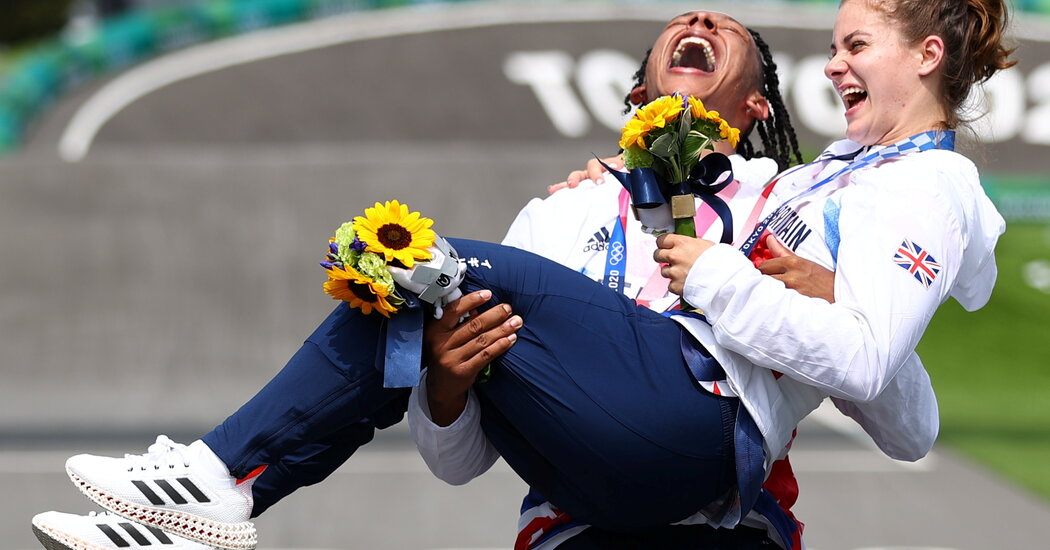Members of The New York Times staff at the Tokyo Olympics reflected on moments that will stay with them from a Games undercut by the pandemic but filled with emotional twists.
When the Olympics happened at BMX
When a great athlete earned an event victory, the culmination of years of practice, dedication and sacrifice, there was some polite applause from a few scattered volunteers, or maybe a shout from a coach. Not the roar of a packed stadium excited by the spectacle they had witnessed.
But at the BMX cycling, one man tried to overcome that. Kye Whyte of Britain had just won a silver medal, and he paused to watch the women’s event. His teammate, Bethany Shriever, had two years before turned to crowdfunding after her state financing was cut. Now, as Shriever surged ahead of the other competitors, Whyte became a one-man cheer squad, shouting his approval and punching the air as she raced to the line. When she won, he lifted her in a bear hug, as joyful about her gold as his own silver.
“Bethany Shriever is absolutely the flipping best,” he said afterward.
The Olympics, with their masks, coronavirus protocols and oceans of empty seats, lacked some of their familiar joy. Whyte managed to bring it back, at least for a moment.
— VICTOR MATHER
A diver’s heartbreaking scratch
It was the women’s 3-meter springboard diving semifinal, and my first time watching the sport live.
Apart from an obvious belly flop, it was hard to tell how the judges could make the fine distinctions between all of these athletes whose twists, midair somersaults and slicing entries into the pool looked so impossibly difficult to me.
Then for her third or fourth dive, Pamela Ware of Canada stepped to the edge of the board and simply jumped, feet first.
Five years of training, persisting through a pandemic, following restrictive protocols to travel to Tokyo, all ending with a 0.0 score on her last attempt. What must she have been feeling? I watched as she bolted out of the water, her coach trailing behind her. She dipped into a tub in the corner of the aquatics center, her back to the pool. My heart went out to her. I hope she gets another chance.
— MOTOKO RICH
An athlete’s joke says it all
The basketball star Diana Taurasi sauntered into a makeshift conference room inside Saitama Super Arena on Sunday afternoon. Before taking her seat before a gaggle of reporters, she demonstratively removed a bottle of water sitting on the table and held up the big glass bottle she had in her hand.
“No water,” Taurasi said, smiling. “Champagne, Ronaldo!”
It was unclear whether everyone in the room got the joke. The soccer star Cristiano Ronaldo created a viral moment this summer at the European Championship when he removed two bottles of Coca-Cola from a table before a news conference.
“Agua!” Ronaldo said, holding up a bottle of water for the cameras.
Taurasi had every right to have a little fun. Moments earlier, she had won her fifth gold medal with the United States after beating Japan. It was clear a weight had lifted from her shoulders.
Indeed, a predominant emotion among athletes at these Games, whether they won or lost, was relief that a long journey, under taxing circumstances, was over.
Taurasi said that when the Olympics were first postponed last year, she set a countdown on her phone to the opening ceremony. In the autumn of her career, Taurasi, 39, was not sure she would make it.
“Can you imagine how long that countdown was?” she said.
Taurasi made it, though, and for a moment she could revel at the finish line, swigging Champagne, slinging one-liners.
— ANDREW KEH
Luck shines through a glitch
I learned two years ago when I was in Tokyo for pre-Olympics reporting that the Japanese skateboard star Yuto Horigome grew up in Tokyo, and that his father, Ryota, was a taxi driver who had taught his son to skate. My loose plan was to return before the Summer Games and write a story on the father, maybe ride around in his taxi. Then the pandemic came, and I did not return to Tokyo until the eve of the delayed Olympics.
I tried to reach Ryota Horigome when I arrived, using contacts to nudge him, but did not hear back for several days. It turned out he was working nine days in a row in the cab. Finally, late one night, I got a response: “Sorry for replying so late. Nice to meet you. I’m not good at English. But I will answer possible. Is that ok?”
What resulted might be my favorite story from the Olympics, and a bit prophetic: Yuto Horigome won gold the day the story ran.
That night I received a note from his father: “Thank you thank you thank you”
— JOHN BRANCH
Touching scenes off the stage
For an Olympics all about restrictions, social distancing and masks, what I’ll remember most about my first Summer Games is the people I met.
The taxi driver who, during an hourlong conversation facilitated by two translating applications, told me about his hometown, Yokohama, where I went often for softball and baseball. The man who worked with the Belgian men’s field hockey team and tipped me off to the sophisticated training techniques it had used for the Tokyo heat ahead of its eventual gold medal run. The Olympic volunteer from Japan who spoke Spanish and was assigned to help the Mexican baseball team.
Latest Updates
There was also the American wrestler whose humanity and personality radiated on the mat and every time she spoke. The French judokas who, many minutes after winning a mixed team gold medal, couldn’t stop hugging each other, posing for photos, bouncing up and down and smiling.
Dominican baseball players were so thrilled to bring home the country’s first Olympic medal in the sport that they fist-bumped volunteers as they walked to the team bus. The Ivory Coast bronze medalist in taekwondo explained how much it meant to her that she had received so many messages of support not simply from her home country but from across Africa. A Polish wrestler was so happy to win a bronze medal that he did a back flip and laughed when his 53-year-old coach flipped him over and slammed him onto the mat.
Tracking the big underdogs
The Philippines, a country of 110 million sports-mad people, had never won Olympic gold until Hidilyn Diaz improbably outperformed a Chinese champion in the women’s 55 kilogram weight lifting division.
Diaz’s delight was infectious. And her story — of a strong girl who grew up in poverty, then toiled abroad as part of the Philippines’ army of overseas workers — was for me one of the most uplifting stories of the Games. When we chatted after her victory, she started off by saying, “Can we talk? I really want to talk.” And she did for 20 minutes, before Olympic officials dragged her to her news conference, where she talked some more.
For a story on why India underperforms at the Olympics, I kept going to see Indian athletes who were considered medal hopefuls. And, with one exception, they all crashed out.
It got to the point where the Indian journalists joked — or maybe they weren’t joking — that I, the sole foreigner tracking the Indian team, was bad luck. Maybe it’s true. One day, I chose between going to women’s field hockey and women’s boxing. I went to boxing. She lost. Without me, the Indian hockey team won.
— HANNAH BEECH
The adventure of the unfamiliar
The Olympics are all about making yourself uncomfortable, covering something you’ve never done before. You can spend two weeks doing the same-old same-old, or you can do something goofy like raise your hand to cover an equestrian competition.
I had never been to an equestrian event, and showed up to write about Jessica Springsteen, the daughter of a pretty big rock star whose music has been the soundtrack to my life. If the key to being a decent reporter is asking a lot of dumb questions, I got in more than my share that night.
A sampling of some of the zingers I asked a few kindhearted souls in the equestrian press who took pity on me: What is going on here? Who’s good? How long is this going to last? Are these thoroughbreds? Do horses like to jump?
Plenty of discomfort. What a joy.
— MATTHEW FUTTERMAN
Fighting in the home of sumo
Walking into the sumo wrestling stronghold that is Kokugikan Arena, the Olympic boxing venue, it became immediately clear that among the sumo crowd it stirs up the kind of affection some American sporting fans have for places like Madison Square Garden, Wrigley Field in Chicago or Hinkle Fieldhouse in Indianapolis.
Boxing may have borrowed Kokugikan for nearly 300 Olympic bouts, but throughout these Games it still belonged squarely to sumo, and it was a welcome touch among Olympic venues that can take on a standardized feel.
Enough touches remained as reminders of what this place is really like when the red box seating divided by rails — known as masuseki — is filled with fans who pay by the group. Portraits of 32 grand champions — yokozuna — line the rafters (with some more in the nearby subway station).
As Olympians waited in the bowels of the arena for buses to and from the Athletes’ Village, wrestlers who live and train nearby could be seen walking around outside in their robes and slippers, not for tourists but simply to get around between training sessions, in hopes of one day becoming yokozuna, too.
— OSKAR GARCIA
A sweet encounter at day’s end
While I was walking back to my hotel from the gymnastics arena at 11:30 one night, two women stopped me and asked, “Are you here for the Olympics?”
I told them yes, and we started talking. They were big Olympics fans. One had been to the 2000 Summer Games in Sydney, Australia, and the Athens Games in 2004.
“We are sad that we can’t go to the Olympics in our own city because of Covid,” said the other, who told me she had worked at a New York City hospital for two years as an autism researcher.
The other woman worked at a store called Ginza Mitsukoshi, calling it the Harrods of Japan.
They asked if I was having a good time. And they had other questions: Did I get a chance to tour Tokyo? Were the athletes nice? What was it like in the venues? After 14 days of quarantine, it was my first interaction with regular Tokyo citizens.
I told them, yes, I was having a good time — especially after meeting them. Meeting local residents is one of my favorite parts of the Olympics. Under a dim streetlamp, we took a selfie and exchanged contact information. They sent me off with a bag from Ginza Mitsukoshi. Inside was a beautifully packaged slice of gluten-free chocolate cake and vegan vanilla cookies. The cookies had smiley faces on them.
— JULIET MACUR
Source: Read Full Article





